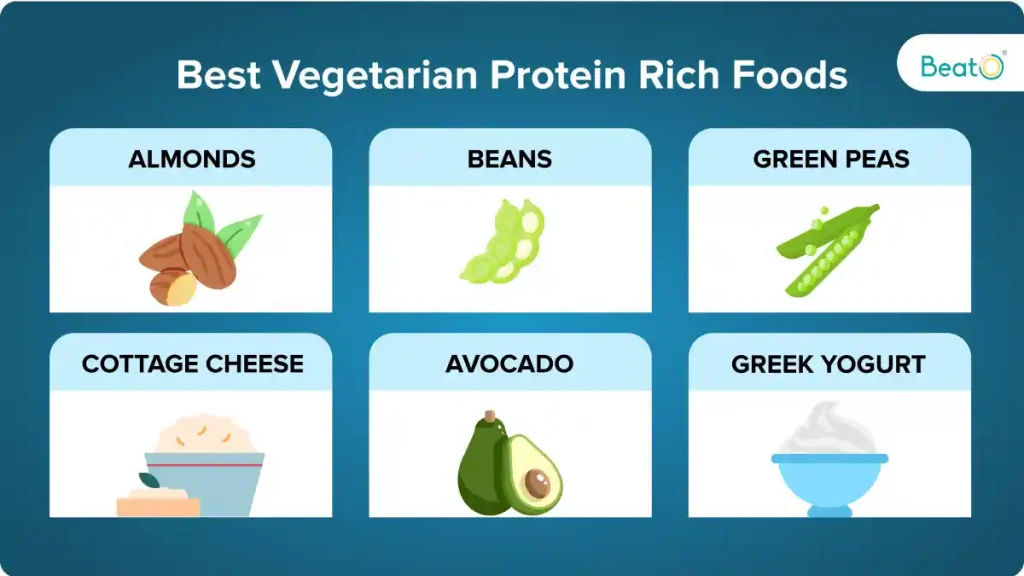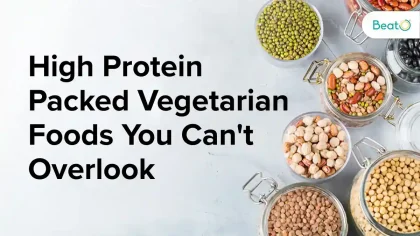As more people become aware of the benefits of plant-based diets, there is growing curiosity about the sufficiency of protein intake among those who choose vegetarian or vegan lifestyles. Contrary to popular belief, vegetarian diets offer many high-protein options that meet but often exceed nutritional requirements.

Proteins are crucial in sustaining muscle mass, cellular function, and overall bodily health. Whether you’re a vegan, a vegetarian, or simply seeking to diversify your diet with more plant-based options, understanding the importance of vegetarian protein sources can empower you to go on a meat-free journey. In this article, we delve into the diverse plant-based protein rich food and provide insights into meeting your protein needs while embracing a vegetarian lifestyle.
Also Read: National Pistachio Day: Exploring the Health Benefits of Pistachio
Best Vegetarian Protein Rich Foods You Can’t Afford to Overlook

Almonds
When it comes to high-protein vegetarian food, the first choice would be nuts. Almonds provide a good amount of protein. They contain about 7 grams of protein per 35-gram serving, making them a valuable plant-based protein source. Almonds are also high in other nutrients such as fibre, healthy fats, vitamin E, and various minerals, making them a nutritious addition to the diet. They’re an excellent choice for vegetarians to stay full. You can enjoy them as almond butter, snack on a handful, or sprinkle them on salads to add more protein. They are also an excellent powerhouse of bone-friendly minerals like Calcium & Magnesium.
Also Read: Black Coffee Benefits And Side Effects
Beans
Beans are a good vegetarian source of protein because they are low-fat and affordable sources of plant protein and provide plenty of variety. Different types of beans, including black-eyed, pinto, butter, cannellini, soya, edamame, and kidney, contain between 7-10g of protein per 100g serving. Baked beans also count as a high-protein vegetarian food, but it is important to keep an eye on the salt content.
Beans are also a good source of fibre, vitamins, and minerals, making them a nutritious addition to the diet. Together with rice, beans provide all nine essential amino acids to form a complete source of protein. By combining different grains with different vegetables and pulses such as beans and rice, or tofu with broccoli, vegans can get the right amount of protein and all the necessary amino acids.
Also Read: 10 Surprising Amla Benefits For Hair Growth & Flawless Skin
Green Peas
Green peas are a good high-protein vegetarian food for several reasons. They contain about 8 grams of protein per one-cup serving, making them a significant plant-based protein source. In addition to their protein content, green peas are also high in fibre, providing about 44% of the recommended daily allowance (RDA) per cup, which helps keep you full and satisfied.
Furthermore, they are a low-fat and affordable plant protein source, offering various vitamins and minerals. Green peas can be more tolerable than beans and other legumes for many people and are versatile, with a sweet taste and creamy flavour that makes them a delicious addition to various dishes.
Cottage Cheese
A one-cup serving of cottage cheese contains around 25 grams of protein, making it an excellent option for people looking for protein rich food for vegetarians. The protein in cottage cheese is mainly derived from casein, a slow-digesting protein that can aid in muscle building and repair. Additionally, cottage cheese is a low-calorie food, making it suitable for those looking to manage their weight while increasing protein intake. It is also a good source of essential nutrients such as B vitamins, calcium, phosphorus, and selenium, which are important for overall health.
Also Read: 7 Incredible Bottle Gourd Benefits For Healthier You
Greek Yogurt
A six-ounce serving of Greek yogurt contains around 17 grams of protein, making it an excellent option for individuals looking for protein rich food veg. The protein in Greek yogurt is mainly derived from casein, a slow-digesting protein that can aid in muscle building and repair. It is also a good source of essential nutrients such as calcium, phosphorus, and vitamin B12, which are important for overall health. The slow-release protein in Greek yogurt is beneficial for muscle recovery after exercise, making it a popular choice among athletes and fitness enthusiasts.
Also Read: 10 Amazing Spinach Benefits For A Healthy Heart And Eyes
Lentils
Lentils are good high-protein vegetarian foods of protein due to their high protein content and nutritional benefits. Lentils are an edible legume that grows in a pod shaped like a lens and does not require soaking before cooking, typically ready in under an hour. Lentils contain around 18 grams of protein per cup, making them an excellent source of plant-based protein. Lentils are versatile and can be used in various recipes, including soups, stews, salads, and curries, making them easy to incorporate into a balanced diet.
Tofu
Tofu is a valuable vegetarian protein rich food for vegetarians due to its high protein content and nutritional benefits. It is a complete protein, containing all nine essential amino acids that the body cannot produce on its own. A 100-gram serving of tofu provides about 8 grams of protein, making it an excellent option for individuals looking to increase their protein intake. Tofu is also a low-fat and low-calorie food, making it suitable for those looking to manage their weight while increasing protein intake. In addition to protein, tofu is a good source of essential nutrients such as calcium, iron, zinc, magnesium, and fibre, which are important for overall health.
Oats
Oats are a beneficial protein rich food for vegetarians for several reasons. A 40g serving of rolled oats contains 4.8g of protein, which typically equates to around 10% of the daily protein needs for most women and 8% for most men. While oats are not considered a complete protein, they contain higher quality protein than other commonly consumed grains like rice and wheat. Additionally, oats are high in fibre, which can aid in digestion and keep you full, and they contain essential vitamins and minerals, including manganese, phosphorus, magnesium, iron, zinc, selenium, and several B vitamins. Oats also contain antioxidants, such as avenanthramides, which can benefit heart health by increasing the production of nitric acid, improving blood flow, and reducing inflammation and itching.
Also Read: 7 Amazing Jeera Water Benefits For Weight Loss
Avocado
A 50g serving of fresh avocado contains 1 gram of protein and a whole 0.14 kg fresh avocado (3 servings) contains 3 grams of protein. While avocados are not a significant source of protein, they are rich in monounsaturated fats, which can help protect against heart disease and lower blood pressure. Additionally, they are a good source of fibre, potassium, vitamin E, and folate, all of which benefit heart and cardiovascular health and are considered a good high protein vegetarian food. The fat and fibre content of avocados can also lead to feelings of fullness, which may help regulate appetite. Furthermore, avocados contain the highest amount of fat, calories, and protein of any fruit, making them a unique protein rich food veg.
Wild Rice
With around 8 grams of protein per cooked cup, wild rice is a protein rich food veg. It is also considered a complete protein, containing all nine essential amino acids, making it a valuable addition to a vegetarian diet. Additionally, wild rice is rich in dietary fibre, providing about 1.8 grams per 3.5-ounce serving, which is essential for keeping cholesterol levels low and promoting heart health. Research has also shown that wild rice has powerful antioxidant properties, which can help maintain a healthy heart, aid in weight loss, boost the immune system, and optimize digestion.
Also Read 10 Amazing Health Benefits Of Pear You Must Know
Conclusion
In conclusion, eating a diet rich in plant-based protein can improve your general health and well-being in several ways. Plant-based protein sources are abundant and range from beans and lentils to tofu and oats. You may get the protein you need by incorporating these foods into your meals and you can also enjoy their amazing taste. Don’t miss out on these tasty and nourishing meals high in protein, whether you’re a vegetarian, vegan, or just trying to increase the amount of plant-based foods in your diet. Try out some new dishes and reap the benefits of a long-term, well-balanced diet, and high-protein diet.
Disclaimer: The content of this article is compiled information from generic and public sources. It is in no way a substitute, suggestion, or advice for a qualified medical opinion. Always consult a specialist or your own doctor for more information. Beato App does not claim responsibility for this information.
Are you looking for the perfect glucometer to check your blood sugar level? Try out BeatO smartglucometerkit, affordable and easy to use.
Discover top-tier diabetes care with BeatO’s Chief Clinical Officer,Dr. Navneet Agarwal. His expertise in Diabetes ensures personalised guidance for overall health. Try out a smartglucometerand keep track of blood sugar levels now.




